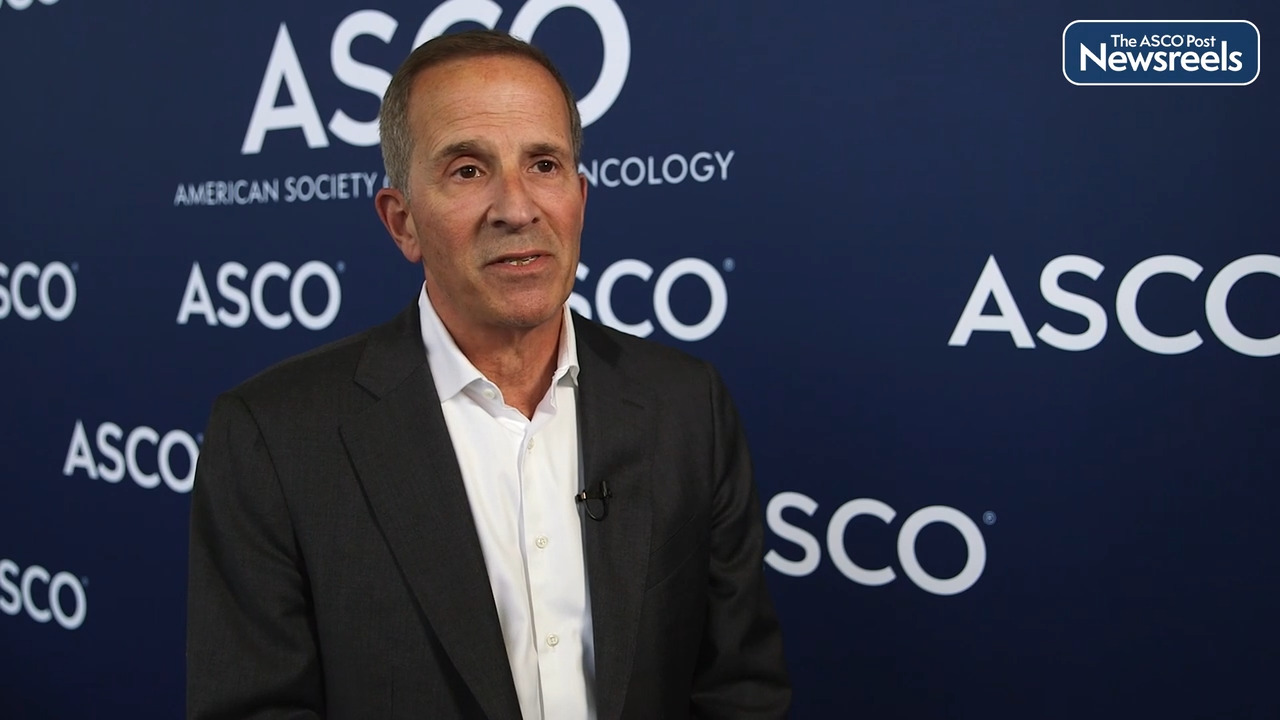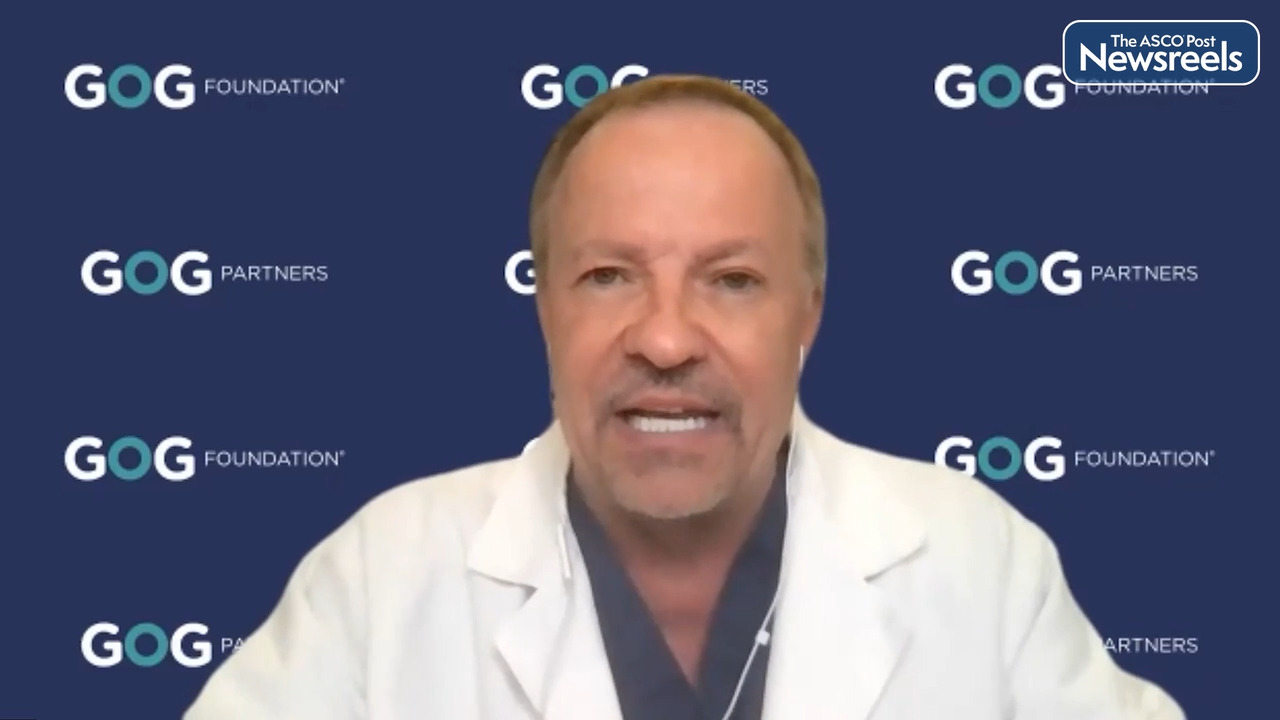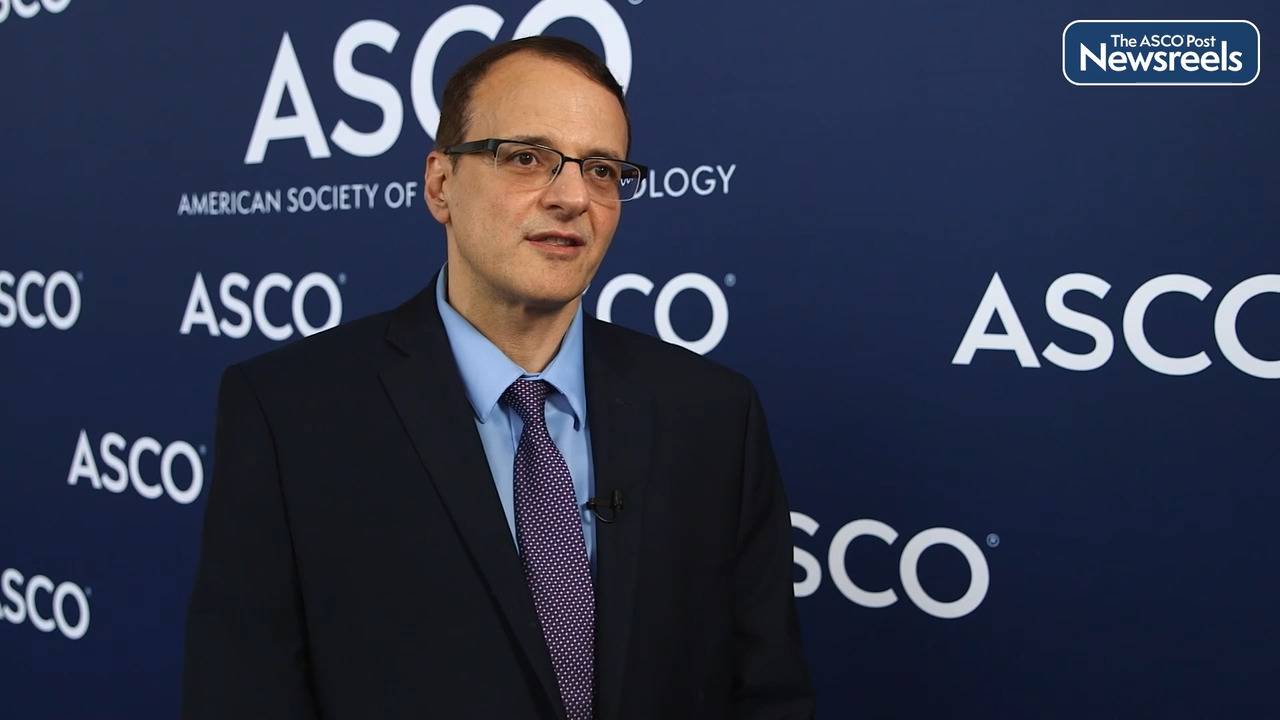Transcript
Disclaimer: This video transcript has not been proofread or edited and may contain errors.
Alicia Morgans: Ian, thank you so much for coming to talk today. I really wanted to pick your brain on the ENZAMET trial and the updated data that you provided at ASCO 2022. Can you tell us a little bit about the study just to start us off?
Ian Davis: Thanks Alicia. So ENZAMET was a cooperative group trial led by Ends Up Cancer Trials Group, looking at bringing Enzalutamide early in the treatment sequence for patients with metastatic hormone sensitive prostate cancer. And when we presented the interim analysis at ASCO 2019, we showed that there was a survival benefit for Enzalutamide. We did not show that there was any additional benefit for triplet therapy with ADT and Enzalutamide and Docetaxel in terms of overall survival. Although there was quite a benefit for progression free survival. So at ASCO, we presented the results of the plan 470 event analysis with a median of 68 months of follow up.
Alicia Morgans: And it was so exciting really to see this follow up data and to try to wrap our heads around whether or not the triplet therapy is going to be the way forward. Because of course, with Arasens and PEACE-1, this is what we're all buzzing about. What do you think after looking at the data?
Ian Davis: Yeah. So look Arasens and PEACE-1 one were great trials and I think everyone was very surprised that we did not show a survival advantage initially when we first presented the data. So now with the more mature follow up, six to eight months of follow up, and 476 deaths, what was shown is that the benefit of Enzalutamide is still sustained. It was 0.67 when we presented it in 2019. Hazard ratio now 0.70, which is highly statistically significant. And the five year landmark survival is 57% for the active control group and 67% for the Enzalutamide group. So it's shown that the benefit is sustained and has not decreased over that time. With the longer follow up, we've been able to do some exploratory subgroup analysis, and that's given us a few insights now into how some of these different groups are behaving. We made a conscious decision to try to drill down and do the analysis based on some of the factors that we knew had prognostic significance. So for example, if patients had synchronous metastatic disease or metachronous metastatic disease at the time they entered the study, we know that has prognostic significance. And also of course, high and low volume disease.
Alicia Morgans: Well, I think that's what's so important because as we're trying to apply this data in practice, what we really want is to give the triplet therapy to those patients who are really going to benefit. And to make sure we back off and maybe use a doublet when patients won't benefit. But one thing that I also wanted to make sure we all think about is that this trial, again, shows that ADT alone or ADT even with one of those earlier generation androgen receptor antagonists, it's just not enough.
Ian Davis: Yeah, that was one of the very clear messages we saw. So we've been very careful not to over interpret these exploratory analyses. There's no statistical analyses here. This is a qualitative eyeballing of the Kaplan-Meier curves and and the forest plots to try to give us that information. But what was really clear was what you just said, for patients particularly in the good prognostic group. Low volume disease in particular where docetaxel probably doesn't have a lot of activity, weak androgen deprivation therapy alone is clearly not enough. Enzalutamide really pushed that survival curve up. So we can be confident that weak ADT alone by itself is not enough. Across the board, we saw the benefit of Enzalutamide was preserved in all of the subgroups we looked at. To a greater or lesser extent depending on the subgroup. So it was quite interesting. We found that regardless of whether you had high or low volume disease, or metachronous or synchronous metastatic disease, your outcomes with Enzalutamide alone, or with docetaxel alone, or with both Enzalutamide or docetaxel all perform quite similarly. So you might ask yourself, "Okay, in what situation then would you want to use the triplet? Why would you put someone through extra toxicity? And in particular, why would you use your docetaxel when it's also a very useful drug in the castrate resistance setting?" Which you'll eventually get to, if there were any messages out of the subgroup analyses, that might be that if you're going to use the triplet, perhaps it might be best reserved for that group that has the worst prognosis. So that would be the high volume, synchronous presentation. That group we know does less well, but looking at the curves, they seem to do better in the patients who had the triplet therapy. So if I were going to be thinking about offering triplet therapy to anybody, it might be for that group only. For everybody else. It would be one of the dual therapy options, either Enzalutamide or Docetaxel together with a ADT.
Alicia Morgans: Well, what an important message. And as we wrap up, what are your thoughts on the toxicity profiles with the double approach or with the approach with the triplet?
Ian Davis: Yeah. We published our health related quality of life data, and patient report outcomes, data from the study. And we showed that Enzalutamide does have some early toxicity, particularly, in fact, in that first part of the treatment, when about half the patients were getting Docetaxel. So there is a cost to be paid for this. But that toxicity was outweighed by the eventual clinical benefit. And the curves crossed and the patients who received Enzalutamide ended up doing better, even in terms of patient reported outcome measures.
Alicia Morgans: And that's so important. And I love the data that you and the team put out. And especially the way that you really characterize this deterioration free survival, that was a beautiful mix of patient reported outcomes and health related quality of life. With clinical outcomes that showed that earlier deterioration and quality of life was, as you said, outweighed by the better disease control. Which is really what our patients I think are looking for the balance between the disease control and the health related quality of life. So as you think about it, I think you've said before, what would your message be, I guess, to all of us, as we're sitting in clinic with a patient? As you're trying to think about this data.
Ian Davis: So a patient with metastatic hormone sensitive prostate cancer needs something other than just basic antigen deprivation therapy. Might be Enzalutamide, might be Docetaxel, might be Abiraterone, might be Apalutamide. All of those are reasonable. If you've already made a decision that they should have Docetaxel, you might consider adding in Darolutimide on the basis of Arasens. But otherwise our data suggests from the exploratory analysis that maybe the triplet therapy might be best reserved for that highest risk group of patients.
Alicia Morgans: That's the message that I get too and certainly the one that I use in my clinic. So I really appreciate you taking the time to talk today Ian.
Ian Davis: Thanks, Alicia it's always a pleasure.





